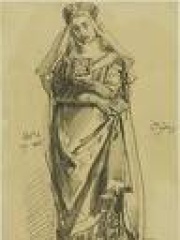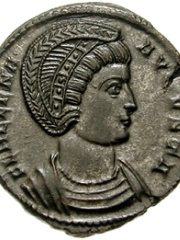
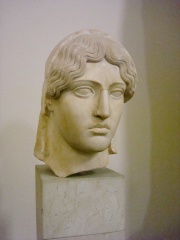
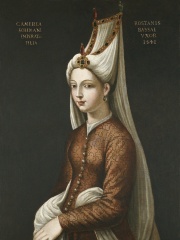
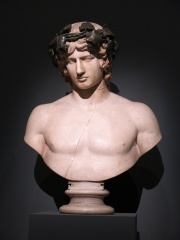
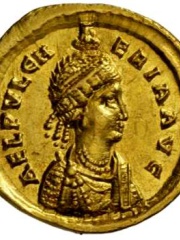


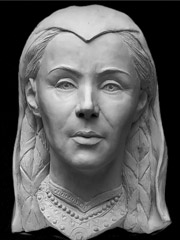
The Most Famous
COMPANIONS from Türkiye
This page contains a list of the greatest Turkish Companions. The pantheon dataset contains 784 Companions, 27 of which were born in Türkiye. This makes Türkiye the birth place of the 6th most number of Companions behind Italy, and Spain.
Top 10
The following people are considered by Pantheon to be the top 10 most legendary Turkish Companions of all time. This list of famous Turkish Companions is sorted by HPI (Historical Popularity Index), a metric that aggregates information on a biography's online popularity. Visit the rankings page to view the entire list of Turkish Companions.

1. Helena (250 - 330)
With an HPI of 85.76, Helena is the most famous Turkish Companion. Her biography has been translated into 67 different languages on wikipedia.
Flavia Julia Helena (; Ancient Greek: Ἑλένη, Helénē; c. AD 246/248 – 330), also known as Helena of Constantinople and in Christianity as Saint Helena, was a Greek Augusta of the Roman Empire and mother of Emperor Constantine the Great. She was born in the lower classes traditionally in the city of Drepanon, Bithynia, in Asia Minor, which was renamed Helenopolis. Helena ranks as an important figure in the history of Christianity. In her final years, she made a religious tour of Syria Palaestina and Jerusalem, during which ancient tradition claims that she discovered the True Cross. The Eastern Orthodox Church, Catholic Church, Oriental Orthodox Churches, Anglican Communion, and the Lutheran Church revere her as a saint.

2. Aspasia (470 BC - 400 BC)
With an HPI of 82.17, Aspasia is the 2nd most famous Turkish Companion. Her biography has been translated into 53 different languages.
Aspasia (; Ancient Greek: Ἀσπασία Greek: [aspasíaː]; c. 470 – after 428 BC) was a metic woman in Classical Athens. Born in Miletus, she moved to Athens and began a relationship with the statesman Pericles, with whom she had a son named Pericles the Younger. According to the traditional historical narrative, she worked as a courtesan and was tried for asebeia (impiety), though modern scholars have questioned the factual basis for either of these claims, which both derive from ancient comedy. Though Aspasia is one of the best-attested women from the Greco-Roman world, and the most important woman in the history of fifth-century Athens, almost nothing is certain about her life. Aspasia was portrayed in Old Comedy as a prostitute and madam, and in ancient philosophy as a teacher and rhetorician. She has continued to be a subject of both visual and literary artists until the present. From the twentieth century, she has been portrayed as both a sexualised and sexually liberated woman, and as a feminist role model fighting for women's rights in ancient Athens.

3. Mihrimah Sultan (1522 - 1578)
With an HPI of 81.60, Mihrimah Sultan is the 3rd most famous Turkish Companion. Her biography has been translated into 45 different languages.
Mihrimah Sultan (Ottoman Turkish: مهرماه سلطان; Turkish pronunciation: [mihɾiˈmah suɫˈtan]; September/November 1522 – 25 January 1578) was an Ottoman princess, the daughter of Ottoman Sultan Suleiman the Magnificent and his wife, Hürrem Sultan. She was the most powerful imperial princess in Ottoman history according to historian Mustafa Selaniki, who described her as the greatest and most respected princess and a prominent figure in the so-called Sultanate of Women.

4. Antinous (111 - 130)
With an HPI of 74.42, Antinous is the 4th most famous Turkish Companion. His biography has been translated into 46 different languages.
Antinous, also called Antinoös, (; Ancient Greek: Ἀντίνοος; c. 111 – c. 130) was a Greek youth from Bithynia, a favourite and lover of the Roman emperor Hadrian. Following his premature death before his 20th birthday, Antinous was deified on Hadrian's orders, being worshipped in both the Greek East and Latin West, sometimes as a god (θεός, theós) and sometimes merely as a hero (ἥρως, hḗrōs). Little is known of Antinous's life, although it is known that he was born in Claudiopolis (present day Bolu, Turkey), in the Roman province of Bithynia et Pontus. He was probably introduced to Hadrian in 123, before being taken to Italy for a higher education. He had become the favourite of Hadrian by 128, when he was taken on a tour of the Roman Empire as part of Hadrian's personal retinue. Antinous accompanied Hadrian during his attendance of the annual Eleusinian Mysteries in Athens, and was with him when he killed the Marousian lion in Libya, an event highly publicised by the Emperor. In October 130, as they were part of a flotilla going along the Nile, Antinous died amid mysterious circumstances. Various suggestions have been put forward for how he died, ranging from an accidental drowning to an intentional human sacrifice or suicide. Following his death, Hadrian deified Antinous and founded an organised cult devoted to his worship that spread throughout the Empire. Hadrian founded the city of Antinoöpolis close to Antinous's place of death, which became a cultic centre for the worship of Osiris-Antinous. Hadrian also founded games in commemoration of Antinous to take place in both Antinoöpolis and Athens, with Antinous becoming a symbol of Hadrian's dreams of pan-Hellenism. The worship of Antinous proved to be one of the most enduring and popular of cults of deified humans in the Roman empire, and events continued to be founded in his honour long after Hadrian's death. Antinous became a symbol of male homosexuality in Western culture, appearing in the works of Oscar Wilde, Fernando Pessoa and Marguerite Yourcenar.
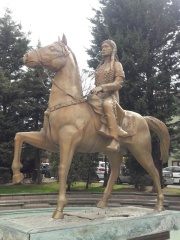
5. Malhun Hatun (1350 - 1324)
With an HPI of 74.09, Malhun Hatun is the 5th most famous Turkish Companion. Her biography has been translated into 31 different languages.
Kameriye Malhun Hatun (also called Mal Hatun or Mala Hatun; died after 1326) was the legal wife of Osman I, the leader of the Ottoman Turks and the founder of the dynasty that established and ruled the Ottoman Empire. She was the mother of Sultan Orhan.

6. Pulcheria (399 - 453)
With an HPI of 73.65, Pulcheria is the 6th most famous Turkish Companion. Her biography has been translated into 44 different languages.
Aelia Pulcheria (; Ancient Greek: Πουλχερία; 19 January 398 or 399 – 453) was an Eastern Roman empress who advised her brother, the emperor Theodosius II, during his minority and then became wife to emperor Marcian from November 450 to her death in 453. She was the second (and oldest surviving) child of Eastern Roman Emperor Arcadius and Empress Aelia Eudoxia. In 414, the fifteen-year old Pulcheria became the guardian of her younger brother Theodosius II and was also proclaimed Augusta. Through her religious devotion and involvement in the contemporary ecclesiastical scene, Pulcheria had significant, though changing, influence during her brother's reign. After Theodosius II died on 26 July 450, Pulcheria married Marcian on 25 November 450, while simultaneously not violating her vow of virginity. She died three years later, in July 453. Pulcheria influenced the Christian Church and its theological development by being involved in the Council of Ephesus and guiding the Council of Chalcedon, in which the Church ruled on christological issues. The Catholic Church and the Eastern Orthodox Church subsequently recognized her as a saint.

7. Hecuba (b. 0)
With an HPI of 73.62, Hecuba is the 7th most famous Turkish Companion. Her biography has been translated into 50 different languages.
In Greek mythology, Hecuba (; also Hecabe; Ancient Greek: Ἑκάβη, romanized: Hekábē, pronounced [hekábɛ:]), was the wife of King Priam and queen of Troy during the Trojan War. With Priam, she was the mother of the warriors Hector and Troilus; Helen's suitor Paris; and the prophetess Cassandra.

8. Gülfem Hatun (1500 - 1561)
With an HPI of 69.70, Gülfem Hatun is the 8th most famous Turkish Companion. Her biography has been translated into 26 different languages.
Gülfem Hatun (Ottoman Turkish: کلفم خاتون; meaning "rose mouth"; 1497 – October/November 1561) was a lady-in-waiting in the harem of Ottoman sultan Suleiman the Magnificent (reign 1520–1566).

9. Agnes of Antioch (1153 - 1184)
With an HPI of 68.24, Agnes of Antioch is the 9th most famous Turkish Companion. Her biography has been translated into 26 different languages.
Anna of Antioch (c. 1154 – c. 1184), also known as Agnes of Antioch and Anna de Châtillon, was Queen of Hungary from 1172 until 1184 as the first wife of Béla III. The accidental discovery of her intact tomb during the Hungarian Revolution of 1848 provided an opportunity for patriotic demonstrations. She was the only 12th-century Hungarian queen whose remains were studied by scientists, and her appearance was reconstructed.

10. Hümaşah Sultan (1540 - 1592)
With an HPI of 67.77, Hümaşah Sultan is the 10th most famous Turkish Companion. Her biography has been translated into 18 different languages.
Hümaşah Sultan (Ottoman Turkish: هماشاہ سلطان; 1543–1582) also known as Hüma Sultan, was an Ottoman princess, the daughter of Şehzade Mehmed (1521–1543) and the granddaughter of Sultan Suleiman the Magnificent of the Ottoman Empire, and his favourite consort and legal wife Hurrem Sultan.
People
Pantheon has 27 people classified as Turkish companions born between 470 BC and 1921. Of these 27, none of them are still alive today. The most famous deceased Turkish companions include Helena, Aspasia, and Mihrimah Sultan.
Deceased Turkish Companions
Go to all RankingsHelena
250 - 330
HPI: 85.76
Aspasia
470 BC - 400 BC
HPI: 82.17
Mihrimah Sultan
1522 - 1578
HPI: 81.60
Antinous
111 - 130
HPI: 74.42
Malhun Hatun
1350 - 1324
HPI: 74.09
Pulcheria
399 - 453
HPI: 73.65
Hecuba
HPI: 73.62
Gülfem Hatun
1500 - 1561
HPI: 69.70
Agnes of Antioch
1153 - 1184
HPI: 68.24
Hümaşah Sultan
1540 - 1592
HPI: 67.77
Kaya Sultan
1633 - 1659
HPI: 67.67
Maria Laskarina
1206 - 1270
HPI: 67.32


